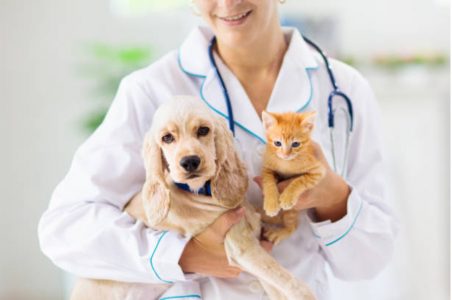Widgetized Section
Go to Admin » Appearance » Widgets » and move Gabfire Widget: Social into that MastheadOverlay zone
It’s Raining Cats and Dogs in Public Administration
The views expressed are those of the author and do not necessarily reflect the views of ASPA as an organization.
By Martin P. Sellers
July 21, 2021

It is critical and long overdue that the field of public administration reaches out to veterinarians (vets) to bring them into the fold, given their knowledge base and the growth of critical, social and public policy related issues. We love our cats and dogs, we ride horses, we grill steaks, we want organic eggs and we are terrified of COVID-19. Animal associated concerns, as they relate to society, are within the scope of knowledge and understanding of veterinarians and veterinarian staff. Public administration must do more to reach out to the protectors of the animal kingdom so that appropriate public policy for a large variety of issues can be created.
Public Policy and Regulation: Vets and their staffs have the knowledge, skills and means of contact that reach the public for gathering information and providing guidance. The public policy domain is where ideas are developed and analyzed, and legislation produced for how government influences and guides our communities regarding enhancing and protecting life. We depend on researchers and experts to provide information and data and help produce policies and legislation that respond to issues that need public attention. This requires forming laws and regulations to guide action in support of public health and safety. It is essential that those who have the most direct knowledge and information be in front of the policymaking process and involved in developing administrative processes. AVMA, AAHA and AAVMC, three leading veterinarian associations, focus only tangentially on public policymaking. However, academia is beginning to take the lead in developing collaborations between veterinarians and public policymakers. This being so, there is now more support for research and development, and the development of better and more cohesive public administration processes and pathways that impact critical animal related issues.
Critical Issues: Here are a few of the current and critical animal related issues that need to be addressed through public policy: analysis of food production, environmental and animal health issues, interspecies viral exchange (for example, COVID-19), growth in world population (food needs), human-animal interaction, animal medical therapies, disease surveillance and the impact of climate change on animal populations. Public administration at all levels of government has not reached out to veterinarians and veterinarian medical colleges. This must happen to create connections for forming best ways of understanding the impact of the animal population on society. This must also happen in order to ensure that governance applies to increasingly important animal related issues. Public policy analysis is becoming more reliable. More data is becoming available, public confidence in public policymaking is increasing, economic loss is better monitored and safety and health concerns are atop the policymaking priority list. State and local governments provide some level of guidance and regulation in specific but limited areas of animal related policy, but there is little consistency between and among states. Policymaking at the state and local level mainly focuses on animal welfare, euthanasia, economic damage, pharmaceuticals and treatment and care. Non-profits, of course, have a focus on animal rights and the One Health initiative.
Healthcare: The One Health initiative began in 2004 as an effort to initiate collaboration between multi-sectoral and interdisciplinary groups. Its purpose is to establish practices that contribute to the health and wellbeing of humans, animals and the environment. This requires recognition by the public, private firms, non-profit agencies and the government of the interconnectedness of humans, animals and environment. The key to collaboration is establishing public administration processes and systems that enable data and information gathering and analysis for the purpose of building regulations, policy and law when and where needed. The interconnectedness of people, animals and the environment is not impacting only the United States, but also is a vastly understudied global concern. Issues that are affecting our global economies and societies that are being addressed at a minimal level include: environmental contamination, habitat loss, biodiversity loss, ineffective disease control, antimicrobial resistance, ecosystem degradation and social determinants of health, all of which would be better affected by having public administration focus on community awareness, data and information gathering and educational development.
Future Needs: In 2013, Lincoln Memorial University was granted provisional accreditation for the most recently built state-of-the-art Veterinarian Medical School in the nation, with full accreditation following in 2019. It has become prominent in supporting the work of One Health and provides advanced learning through several master’s and doctoral degree programs. The School of Veterinary Medicine is considering allowing students to enroll in the MPA degree program. The purpose of bringing vet students into the world of public administration early in their careers is to ensure that they develop knowledge of administrative practices that include important regulatory considerations and policymaking processes. It is important to continue the development of collaboration between vets, schools of veterinarian medicine and the public. This is what public administration is about.
Author: Martin P. Sellers, PhD, MPA, MBA, is Dean of the School of Arts, Humanities, and Social Sciences at Lincoln Memorial University (LMU) in Harrogate, Tennessee. He led the creation of the MPA program at LMU in 2015 which went fully online in 2019.. Before academics, he worked in all four levels of government, city, county, state and national including the US Department of Agriculture. In addition, as Dean of Research at LMU, he was able to encourage collaboration between diverse colleges and develop pathways for intercollegiate scholarship. He may be reached at [email protected] and @martysellers.


Burden S Lundgren, MPH, PhD, RN
July 23, 2021 at 10:48 pm
Please let me point out that public health (even before the One Health movement) has involved veterinary professionals for a very long time – although certainly not enough of them.